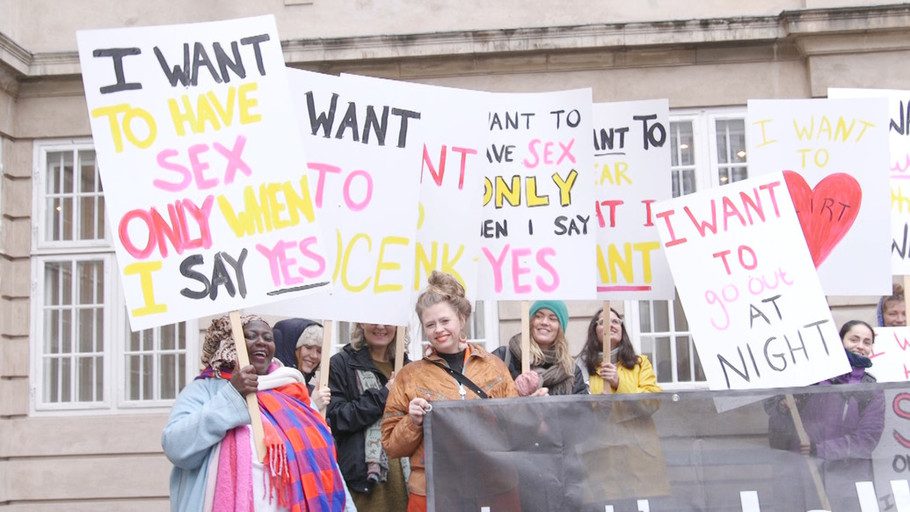On 24 January, as final negotiations on the EU Directive on combating violence against women and domestic violence are taking place, Amnesty International and 11 other NGOs called on negotiators to take effective action and ensure that a robust Directive is urgently adopted.
An open letter to negotiators in the Belgian Presidency of the Council of the European Union, Member States, the European Parliament and the European Commission ahead of the final negotiations of this mandate on the Directive on combating violence against women and domestic violence (COM (2022) 105 final, 8 March 2022)
We are writing as concerned organisations[1] that advocate for human rights, gender equality, and the right for all to live free from violence.
As we have entered the final weeks of European Union institutions’ ability to negotiate legislative files before the next European elections, we call on European governments to level up and take effective action to combat violence against women and domestic violence by urgently adopting a robust Directive. We welcome this proposed Directive, as it provides much needed comprehensive responses, incorporating prevention, protection, support for victims and prosecution for a range of criminal offences which constitute violence against women and domestic violence.
The adoption of this Directive is, however, endangered due to several Member States’ failure to agree to strengthen laws and policies at the EU level and endorse crucial measures supported by the European Commission and the European Parliament, as well as by diverse civil society organisations across Europe. If agreement is not reached in the next weeks, there are serious risks of this proposal being further weakened or not adopted at all under the next mandate of the European Parliament. This would leave women and other people affected across the EU without adequate protection from gender-based and domestic violence.
We urge national governments to transform lip service to ending violence against women into concrete and effective action against this scourge that affects millions in the EU, including by ensuring that rape based on lack of consent is a criminal offence across the EU.
We have been dismayed to see Member States propose rejecting the unprecedented opportunity to criminalise rape in this Directive. It is utterly unacceptable that some Member States are stubbornly unresponsive to the need to combat rape across the EU, hiding behind restrictive legal interpretations on EU competences. Sexual violence against women is endemic across the EU, with widespread impunity. Consent-based definitions have proven to guarantee greater protection and access to justice for women and other victims of rape, including increased reporting and prosecution rates.
We urge governments to act in accordance with their international and regional human rights obligations, particularly under the Istanbul Convention, and agree on the most robust Directive possible to prevent, prosecute and redress violence against women.
Therefore, as organisations closely engaged on the issues at hand, we call on Member States to ensure that the Directive criminalises rape with a consent-based definition, as well as female and intersex genital mutilation, forced sterilisation, forced marriage, and sexual harassment in the workplace. It should combat violence on grounds of sex and gender, and address intersectional discrimination, with specific attention paid to LBTIQ+ women, women sex workers, and women who are undocumented migrants or have an insecure or dependent residence status. We call for strengthened protection and access to justice for victims, including access to compensation and safe reporting mechanisms through the establishment of strict firewalls between immigration and other authorities to ensure survivors are not deterred from reporting violence due to their residency status. The Directive should further guarantee comprehensive support to victims and access to both general and specialist support services, including the clinical management of rape and comprehensive sexual and reproductive health care for victims of sexual violence, as well as support for child victims. We also call for the adoption of widespread and effective preventive measures, including a clear obligation to provide comprehensive sexuality education.
For more detailed recommendations, we refer to our joint position published in 2023.
There are times when political decisions can make a profound difference to millions of people’s lives. This is one of them. Member States have an opportunity to enact a Directive that can be truly transformative. We call on you to show courage and leadership and grab this opportunity.
Sincerely,
Amnesty International
Center for Reproductive Rights
End FGM European Network
EuroCentralAsian Lesbian* Community (EL*C)
European Sex Workers Rights Alliance (ESWA)
Human Rights Watch
International Planned Parenthood Federation – European Network (IPPF EN)
La Strada International, European NGO Platform Against Trafficking in Human Beings
Organisation Intersex International Europe (OII Europe)
Platform for International Cooperation on Undocumented Migrants (PICUM)
The European region of the International Lesbian, Gay, Bisexual, Trans and Intersex Association (ILGA-Europe)
Transgender Europe (TGEU)
[1] Our organisations work on a diverse range of women’s rights issues. In the drafting of this document, we have been led by the expertise of women’s rights organisations and women human rights defenders from communities most impacted by the specific forms of violence described in each section. Our commitment to the text represents our coming together as a collective with shared values, even though not every organisation has its own policy or programme of work dedicated to each issue. We centre and affirm the expertise of women human rights defenders in all their diversity, and encourage the European Commission, the European Parliament, and the Council of the EU to do the same.


